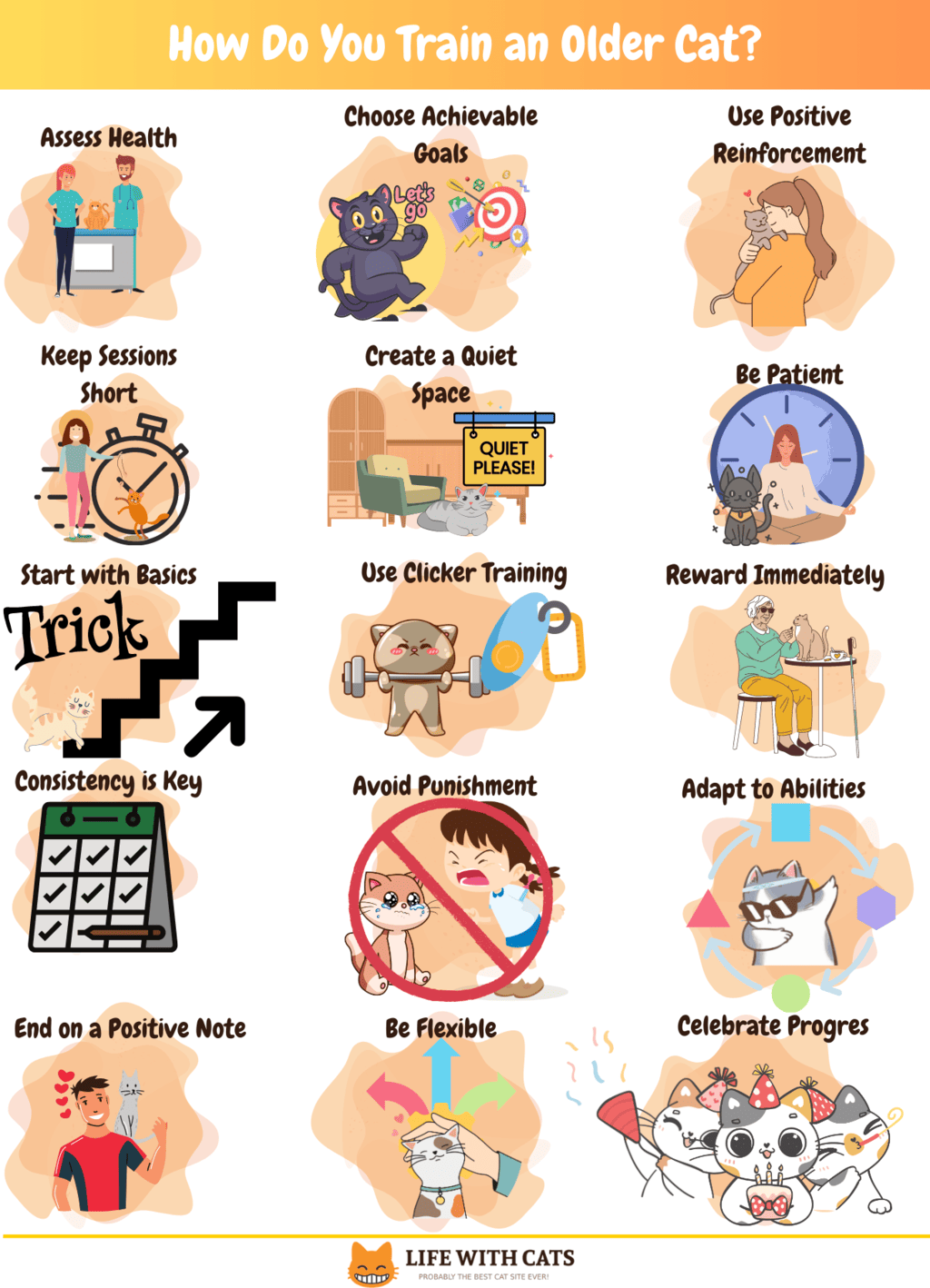Senior cats are older felines that are classed as senior by vets once they reach 11 years of age and older.
As with elderly humans, senior cats often have special health, dietary, and care needs because of the natural aging process. For example, your cat’s metabolism will be slower, she might develop age-related illnesses, become less active, and possibly develop dental problems.
In addition, an old cat might be less able or willing to use her litter box, her appetite could be reduced, and she probably won’t be as interested in playtime as she once was. Some cats develop cognitive issues, such as feline dementia, that can lead to nighttime wandering and excessive vocalization. In my experience, most elderly cats like to spend most of their day sleeping somewhere peaceful, waking up for meals and short playtime periods.
Caring for an older cat is much the same as looking after a young one, with a few special considerations.
Cats are masters at covering up when they don’t feel great, so regular veterinary checks are essential to be sure your cat’s not hiding any underlying health conditions, especially when in her teens. Cats’ nutritional needs change as they get older, so you must remember to change your cat’s food for a special senior diet once she reaches the magic number of ten years old. An older cat likes to feel warm, comfortable, and safe, so you must provide your pet with a cozy bed and somewhere quiet to rest.
Of course, older cats tend to be more prone to health conditions than their younger counterparts. Some common cat ailments include arthritis, chronic kidney and liver disease, hyperthyroidism, cancer, tumors, high blood pressure (hypertension), respiratory issues, and heart disease.
For that reason, most people don’t want to take on a senior cat from a rescue or shelter, preferring younger cats or kittens, so too many of these deserving cats are left behind. But I’ve had several teenage kitties from rescues that have been every bit as loving and fun as younger models, despite a few aches and pains. All these cats want is to live out their lives in a comfortable forever home, so if you decide to give a home to a senior feline, well done!
But first, read this comprehensive guide to learn everything you need to know about senior cat care and behavior!
How Old Do Cats Live?
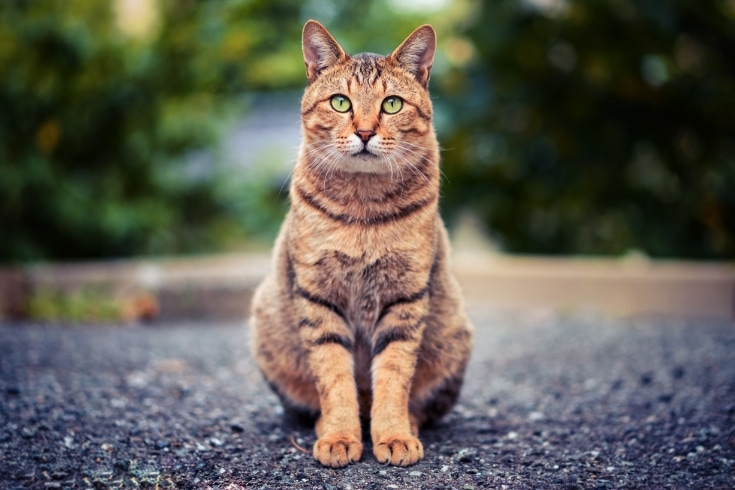
Senior cats can live for 13 to 17 years of age, depending on their overall care and health. I’ve had two cats who survived until they reached 19 years of age, despite having a few health conditions, including hyperthyroidism and kidney disease.
In fact, the oldest senior cat age, according to the Guinness Book of World Records, was an amazing kitty from Texas called Cream Puff, who lived to the incredible age of 38 years and 3 days!
Statistics show that indoor cats tend to live longer than outdoor, probably because they don’t risk crossing busy roads and are not exposed to potentially dangerous wildlife and severe weather conditions. That said, both my feline oldies were free to come and go as they pleased, and I believe the excitement of an outdoor/indoor life kept them fit and mentally alert!
How Do You Know The Age Of A Cat?
Unlike with horses, you can’t tell an adult cat’s age by its teeth, although general wear and tear and the degree of tartar buildup on the teeth can give a few clues to a cat’s age. Generally, the more staining and tartar on the cat’s teeth, the older she is.
When a cat reaches the age of six or seven, her eye lenses become denser and can appear cloudy when viewed with an ophthalmoscope by your vet. However, cloudiness is not noticeable to owners until the cat reaches around 10 years old when her eyes might appear a little cloudy. In addition, cats are generally very diligent when grooming, and old cats often stop being so fussy about licking and grooming their coats.
You might also notice joint stiffness in an older cat and a few other physical changes, such as a sunken back and less muscle tone. A neighbor’s cat, Hardy, regularly visits my home; I reckon he’s an old guy! When Hardy jumps down from the fence, his landing is more splat than spring, and he has a dropped tummy and a few teeth missing, all pointing to a teenage kitty.
When Are Cats Considered Seniors?
According to International Cat Care, senior cats are defined as those aged 11 to 14, and super-senior felines are those aged 15 years and older.
So if one of your friends asks you, “When is a cat a senior?” now you can tell them that vets class any cat over the age of 11 as being senior.
What Are The Behavioral Characteristics Of Senior Cats?
Senior cat behavior is somewhat different from that of younger kitties, depending on the age of the cat concerned.
The most noticeable trait in an old cat is that she will sleep for longer periods than a kitten or younger feline. You might also notice that your cat is less playful as she gets older, although that can depend on the cat’s breed and individual temperament. Old cats are generally not as athletic as younger ones or as fast on their feet, so your furry friend might not bring as many mice home as she once did because she’s no longer quick enough to catch them.
In my experience, old cats would rather spend their time snoozing on your lap in front of the fire than playing, although there are exceptions to that rule.
If a stray cat turns up on your doorstep looking for a home, which has happened to me a few times over the years, you’ll want to know how old she is. So, here are some telltale signs of old age in cats to give you a few clues!
What Are The Signs Of Old Age In Cats?
When it comes to spotting the signs of aging in cats, senior cats don’t always look much different from younger ones unless they have a health condition, such as hyperthyroidism, that causes marked weight loss or matted fur because they can no longer groom themselves as efficiently.
However, a change in cats’ behavior often gives their age away.
Decreased Activity
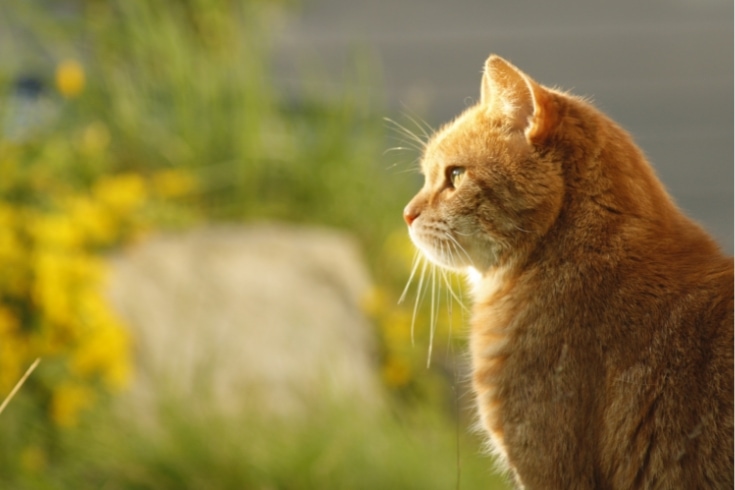
The older your cat gets, the less active she will likely be. That decreased activity is often noticed in outdoor cats that suddenly spend more time indoors. As with one of my elderly cats, once she became less able to easily jump onto the garden fence and chase the birds in my backyard, my pet opted for a less strenuous lifestyle, preferring to snooze on the patio instead.
Altered Playfulness
Most cats enjoy interactive playtime with their owners, but elderly cats tend to lose interest in energetic games as they age, preferring something more leisurely, such as a puzzle box to figure out, rather than galloping after a feather wand toy.
Increased Vocalization
Sometimes, senior cats become more vocal, meowing more frequently or loudly, and discomfort, cognitive changes, or attention-seeking could cause that behavioral change.
Changes in Appearance
Older cats can develop a dropped-back or pouchy belly, a common change in body composition. This phenomenon results from muscle loss and decreased skin elasticity, and it’s essential for cat owners to recognize this sign as a part of the aging process.
Changes In Grooming
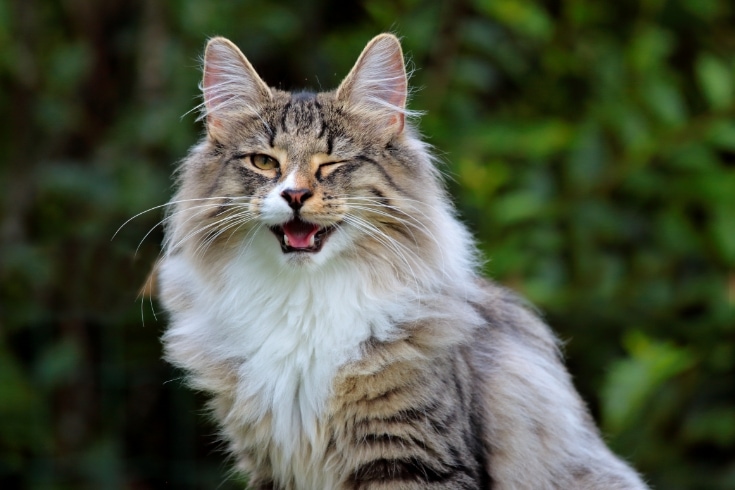
Due to a lack of flexibility or joint pain, an old cat might groom herself less effectively than she did in her younger days, leading to an unkempt appearance or matted areas of fur. In contrast, over-grooming can sometimes be a problem for older cats, usually because of skin conditions or possibly due to pain in a specific area.
Reduced Appetite
Reduced appetite is often a problem for senior cats, typically because of a decreased sense of smell or some underlying health condition, and that can result in weight loss if not addressed promptly.
Weight Changes
Old age in cats can sometimes lead to weight gain due to reduced activity levels or weight loss because of medical conditions and less appetite.
Cognitive Changes
Cognitive dysfunction is a surprisingly common health problem for older cats. One of my cats suffered from this distressing condition, which caused her to wander around the house at night, yowling. Fortunately, there are drugs available that can help manage feline dementia, so have a chat with your vet if you think your cat is suffering from this condition.
Affection And Socialization
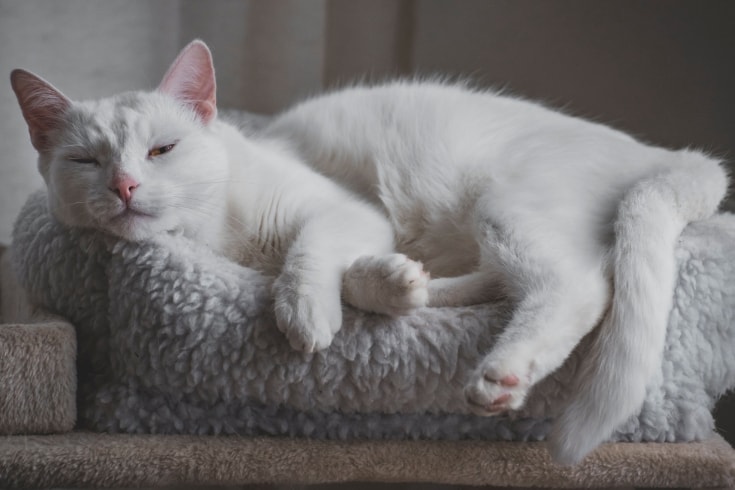
Some senior cats might become more affectionate and attention-seeking, while others could become more withdrawn, preferring solitude and the comfort of a warm bed away from noisy distractions, such as young kids and other pets.
My friend’s elderly cat began spending all her time sleeping in a cozy bed beside the Aga in the kitchen until one day, she simply passed away peacefully in her sleep.
Territorial Behavior
Cats are territorial animals that like to claim their own space in your home or garden. As your cat ages, she might not be quite as bothered about sharing her space with you or other pets, or on the other hand, she might become even more possessive and even aggressive.
Litter Box Changes
Older cats might have accidents outside the litter box or be reluctant to use it due to medical issues like arthritis that makes it hard to climb into the box or due to cognitive changes. Your cat might also visit the litter box more often if she has kidney problems or cystitis. Of course, if you notice drastic changes in your cat’s litter box habits, ask your vet for advice, just in case your pet has a health condition that needs treatment.
What Are Some Examples Of Odd Behavior In Senior Cats?
Senior cats’ odd behaviors can be hard to explain; some are distressing for owners and their pets.
Here are a few strange behaviors you might notice in your senior cat.
Excessive Vocalization
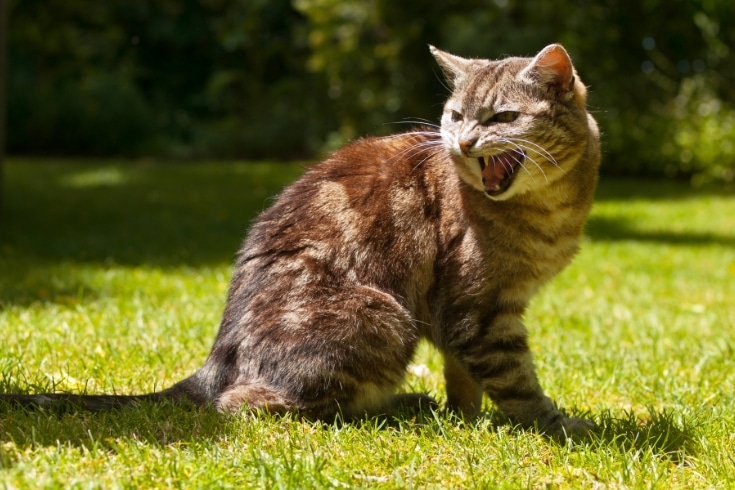
As some cats age, they sometimes get more vocal than they were during their younger years. That can be because of a few different reasons, such as discomfort, pain, a sensory decline (like hearing loss), or cognitive dysfunction (feline dementia).
Pacing Or Wandering
If your cat wanders randomly around your home or paces back and forth, that can indicate disorientation or anxiety and might be a symptom of cognitive decline or some underlying health issue that needs veterinary attention.
Nighttime Restlessness
Senior cats sometimes become more restless at night, sometimes because of changes in their sleep-wake cycle, discomfort, or cognitive issues that a vet should examine.
Unusual Aggression
If a previously placid cat becomes aggressive, that could be due to pain, discomfort, fear, or cognitive dysfunction. All these things can leave the cat feeling more vulnerable and cause her to react defensively to a perceived threat.
Hiding Or Isolation
Hiding away or preferring her own company to that of other pets or people is often a sign that a cat is in pain or distress. As cats age, they often seek solitude, especially if they’re not feeling well, so it’s a good idea to consult your vet for advice if your previously friendly kitty suddenly doesn’t want your company.
Increased Or Decreased Affection
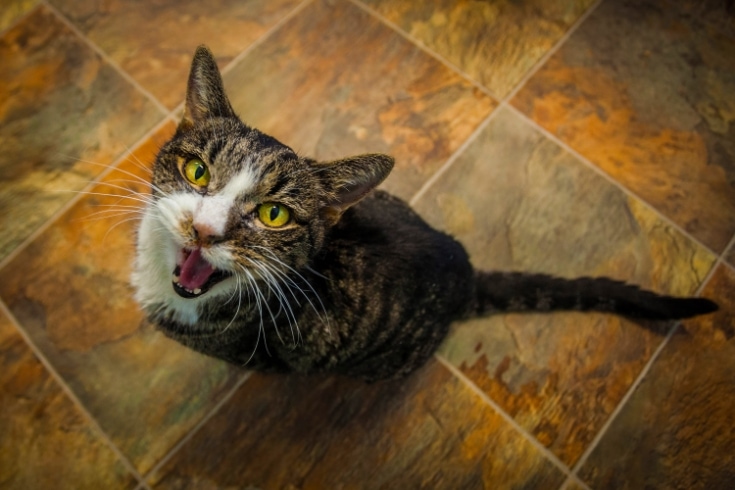
Some senior cats become clingier with age, seeking more comfort and attention, while others withdraw altogether, preferring not to be touched or petted. Pain, cognitive changes, or underlying health conditions can influence that behavior.
Litter Box Changes
Older cats sometimes have issues using the litter box consistently or at all, even though their toilet is clean and well-maintained. That behavior is often due to conditions such as arthritis that make it difficult to enter or exit the box, urinary/fecal incontinence, or other medical issues.
Staring Into Space
Staring into space or gazing at a wall is generally a sign of cognitive dysfunction in cats, where the cat appears to zone out or become less interested in her surroundings.
Excessive Grooming
Over-grooming or grooming a specific area of her body or paws can indicate that the cat is in discomfort or pain caused by skin conditions and can also be a behavioral issue related to stress.
Pica (Eating Non-Food Items)
Senior cats might occasionally eat non-food items, such as paper or their own feces. That phenomenon can be caused if your cat has a diet deficiency, painful dental issues, or cognitive dysfunction.
Startling Easily
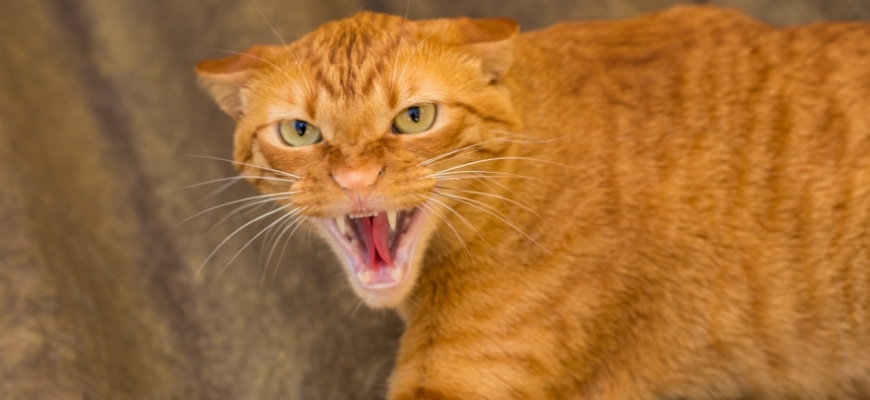
Old age can cause decreased sensory abilities, including hearing or vision, and that can make senior cats more likely to be startled by sudden movements or noises.
Disorientation
Disorientation can be a sign that your cat is suffering from cognitive dysfunction or some other neurological problem. Cats with those conditions often appear confused, get stuck in corners, or have trouble navigating familiar spaces.
Changes In Interaction
Senior cat behavior can alter how they interact with their owners or other pets, often due to failing senses, pain, or cognitive changes.
What Are The Possible Diseases For Senior Cats?
Possible diseases that can affect senior cats can generally be successfully managed, provided they are spotted early. As cats age, they can become more susceptible to a range of medical conditions. While not all senior cats will experience these health problems, it’s important for cat owners to be aware of them to ensure early detection and proper care.
Chronic Kidney Disease (CKD)
Chronic Kidney Disease (CKD) is a condition that causes a cat’s kidneys to deteriorate over time, decreasing their ability to filter out waste from the cat’s bloodstream. Signs of CKD can include increased thirst, frequent urination, weight loss, and lethargy.
Hyperthyroidism
Hyperthyroidism is the term used to describe a condition where the cat’s thyroid gland produces too much thyroid hormone. That causes symptoms such as weight loss despite a good appetite, increased thirst and urination, restlessness, and a rapid heart rate. Treatment options for hyperthyroidism include medication, radioactive iodine therapy, or surgery.
Thankfully, both my hyperthyroid cats were managed successfully by drug therapy, and went on to live long, happy lives.
Diabetes
Diabetes in cats is similar to human diabetes and happens when the cat doesn’t produce enough insulin. The symptoms of diabetes can include increased thirst, frequent urination, weight loss, and appetite changes, but with early diagnosis and proper management, many cats with this common condition can lead a normal life.
Arthritis
Arthritis is a common degenerative condition affecting one or more joints, causing pain and stiffness. Cats with arthritis might show decreased activity and athleticism, difficulty jumping, or a stiff gait, but pain management and joint supplements can help improve their quality of life.
Dental Disease
Dental problems, such as gingivitis and periodontitis, often affect senior cats, causing symptoms including bad breath, difficulty eating, and red or swollen gums. You can prevent dental problems from affecting your cat by ensuring she has regular dental check-ups and cleanings.
Heart Disease (Hypertrophic Cardiomyopathy)
Hypertrophic Cardiomyopathy is a condition that causes thickening of the heart muscles, which can eventually lead to heart failure. Symptoms can include rapid breathing, lethargy, or fainting, although the condition can be managed with medication if spotted early.
Cancer
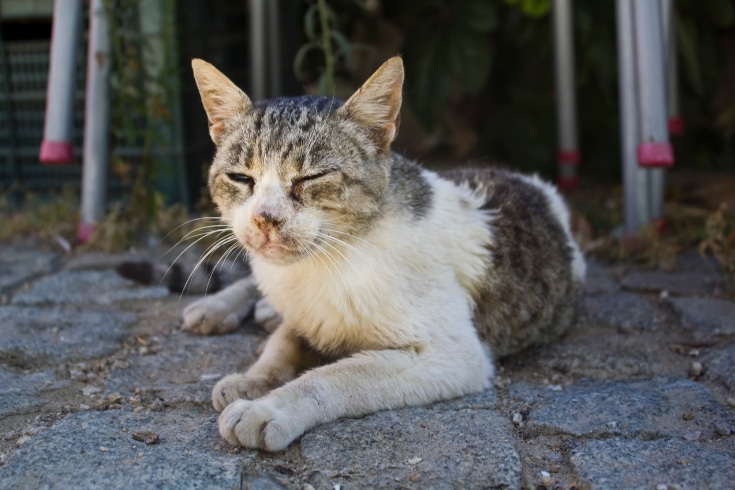
Cats, like people, can develop various forms of cancer. Lumps, unexplained weight loss, or changes in behavior can be indicators that your cat has a malignant tumor or some other form of cancer. As with many senior cat diseases, early detection and treatment are crucial for the best outcome for your beloved pet.
Thyroid Tumors
Thyroid tumors can either be benign or malignant and, if left undiagnosed, can lead to an overactive thyroid gland. Treatment might involve surgery, medication, or other therapies and are not always successful in senior cats.
Cognitive Dysfunction Syndrome (Cat Dementia)
Cat dementia, or cognitive dysfunction syndrome, as it is more correctly known, is very common in older cats. The symptoms of this disease can include confusion, disorientation, excessive vocalization, irregular sleep patterns, and some cats can even appear drunk. Although there’s no cure for this distressing condition, it can be managed to some extent by drug therapy.
Hypertension (High Blood Pressure)
Hypertension or high blood pressure can lead to damage in various organs, including the eyes, kidneys, and heart. I had an elderly cat who developed hypertension, leading to weight loss, confusion, and even blindness because the pressure in her eyes caused her retinas to detach.
Inflammatory Bowel Disease (IBD)
IBD causes chronic inflammation of the cat’s intestines, leading to symptoms like vomiting, diarrhea, or weight loss. If it’s diagnosed quickly enough, the condition can be managed through dietary changes and drug therapy.
Lower Urinary Tract Disease
Lower urinary tract disease encompasses a wide range of different conditions that affect the bladder and urethra. Symptoms can include blood in urine, straining to urinate, or frequent urination, and diagnosis and treatment vary depending on the specific condition causing the symptoms.
Respiratory Issues
Senior cats can be prone to certain respiratory conditions, including asthma and bronchitis. Symptoms typically include coughing, wheezing, or difficulty breathing, and effective treatment generally involves inhalers or other medications.
Liver Disease
Various triggers, including infections, tumors, toxins, or other causes, can cause cat liver disease. Symptoms commonly include jaundice, vomiting, and weight loss, and early detection and appropriate treatment are essential to keep your cat comfortable and manage the condition.
How Should You Care For Senior Cats?
Caring for older cats is not dissimilar to caring for cats in general, although senior cat care does differ in some respects, and we’ll discuss that in more detail below.
Regular Veterinary Visits
Most of the health conditions that commonly affect older cats can be effectively treated and managed, provided they are diagnosed soon enough, so regular veterinary visits become even more important as your cat enters her senior years.
In addition to routine vaccinations, your vet will thoroughly examine your cat to check for any underlying health conditions that might be developing unnoticed. Dental checkups are also crucial for older cats whose teeth are somewhat the worst for wear and potentially make it difficult or even painful for your cat to eat.
Dietary Adjustments
Your cat’s nutritional requirements change as she gets older, so you must remember to switch her diet to a senior-specific one to be sure she gets everything she needs to remain healthy.
Weight Management
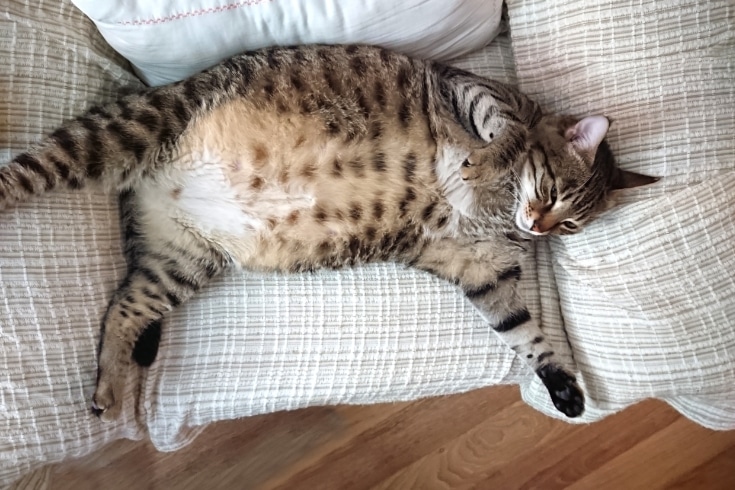
Older cats can be less active than their younger counterparts, which potentially leads to weight gain and associated health conditions, including diabetes. However, weight loss can indicate health conditions such as hyperthyroidism or dental problems that are preventing your cat from eating.
Hydration
Cats are notoriously bad at drinking, which can worsen with age, potentially leaving your senior cat vulnerable to dehydration. You can help to hydrate your cat by including a portion of wet food in her diet instead of it consisting mainly of kibble.
Of course, you must ensure that clean, fresh water is always available for your senior cat to drink.
Comfortable Environment
Like elderly people, senior cats appreciate a warm, comfortable environment free from drafts and a soft, cozy bed to sleep in. Old cats typically prefer peace and quiet, so set aside a tranquil area in your home that’s well away from noisy kids and other pets where you’re elderly cat can rest.
Litter Box Access
Ensure that your cat’s litter box is easy for her to get to and isn’t too deep for her to climb in and out of comfortably.
If the litter box is too deep, an elderly cat with stiff joints will struggle to climb in and out of it. In addition, the litter box should be positioned somewhere the cat can see it and get to it easily.
Grooming Assistance
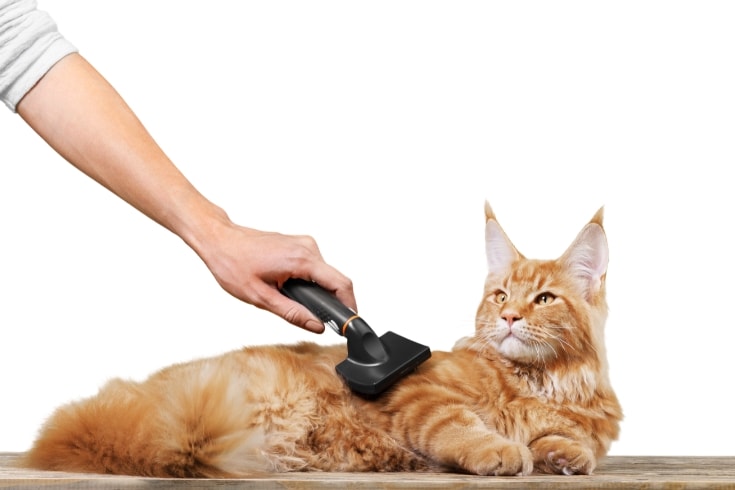
Some older cats find grooming difficult due to stiff joints or cognitive dysfunction, so be prepared to give your kitty a helping paw by brushing her daily. That will help to prevent your pet’s coat from matting and helps to strengthen the bond between you.
Exercise And Play
Mental and physical exercise and playtimes are just as important for elderly cats as they are for kittens. However, you might need to substitute some of your cat’s more energetic games for something more sedate that she can easily cope with as she gets older.
Puzzle games are an excellent option for senior cats because they help keep your pet’s mind active and provide gentle physical exercise.
Joint Health
Your cat’s joints might become less flexible, potentially leading to mobility issues in her senior years. You can try to mitigate that to some extent by including a joint supplement in her diet and asking your vet for advice on possible drug therapy.
In addition, gentle physiotherapy in the form of stretching exercises can be highly beneficial for cats with arthritis.
Dental Care
As mentioned earlier, elderly cats can suffer from poor dentition, so keep an eye out for oral pain and symptoms of dental disease, including not eating, bad breath, weight loss, and chewing on one side only.
Broken or loose teeth and gingivitis can be spotted at a veterinary checkup, and an appropriate course of treatment can be started, so don’t skimp on regular vet visits!
Comfortable Bedding
Elderly cats with stiff joints appreciate supportive, orthopedic bedding that keeps their arthritic joints well away from cold, hard floors, so you might need to think about changing your senior cat’s current sleeping arrangements.
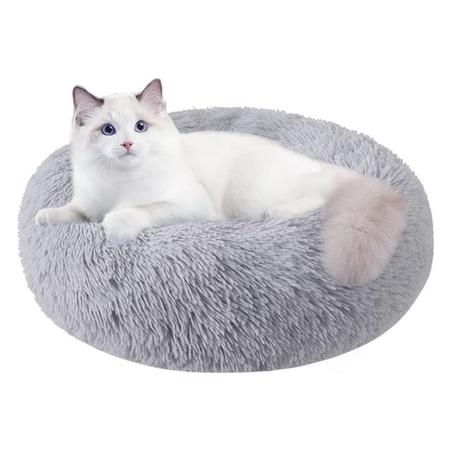
Emotional Well-being
Don’t forget about your old cat, which is easily done if she spends most of her time asleep in her bed. Senior cats need plenty of attention, affection, and bonding time for their emotional well-being and stress-free life.
Medical Monitoring
As mentioned already, the best way to treat an old cat’s ailments is to identify them before they become a real problem for your pet, so do take your cat for regular veterinary checkups and keep an eye on her for potential health problems that behavioral changes might give away.
Pain Management
Some conditions elderly cats suffer from, such as arthritis, can be incredibly painful, so be sure to talk to your vet about an effective pain management regimen for your pet.
Adjust to Sense
As cats age, their senses sometimes become less acute, and you need to make allowances for that in your home.
For example, I had an elderly cat who went blind due to hypertension. My cat displayed no symptoms whatsoever except that her eyes appeared somewhat cloudy. Around that time, I was packing to move house, so there were boxes and crates of my stuff all over the place. One evening, I noticed my cat bumping into things, and that was when I realized she had gone completely blind.
My vet explained that the cat had probably been seeing only dim shadows for quite some time, but because she was so familiar with her environment, she had been able to navigate her way safely around my home.
My cat coped well with the house move and quickly adapted to finding her way around a new place. She could even go out in the garden for some fresh air and exercise under supervision because the yard was completely fenced, and she could not get out.
Anti-Stress Measures
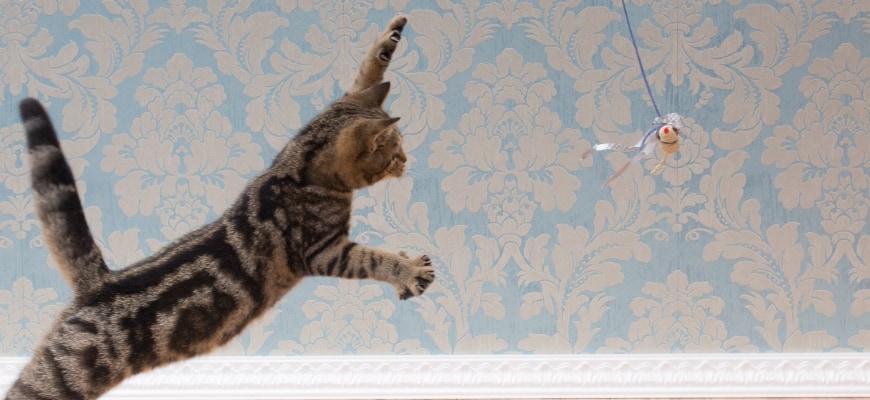
You can keep stress to a minimum for your elderly cat by sticking to a regular routine, providing her with somewhere peaceful and quiet to rest, and ensuring your pet gets plenty of gentle exercise and playtime sessions.
Safety Measures
If you have an elderly cat with mobility or sensory issues, such as failing eyesight, deafness, or severe arthritis, you might need to put in place a few safety measures to protect her from accidents around your home.
For example, when I owned a blind cat, I blocked off the open gallery sides on my upstairs landing so that my pet wouldn’t accidentally fall through if she lost her bearings.
Emotional Support
Remember to pay lots of attention to your senior cat and spend quality time with her! That can easily be overlooked if your pet spends most of her time sleeping in bed. It’s important to provide ample attention, affection, and bonding moments to give your old girl the emotional support she needs to live in a happy, stress-free environment.
Senior Cat Behavior And Care FAQs
In this part of our guide, we answer some of the most frequently asked questions about senior cat behavior and care.
How Does The Behavior Of Senior Cats Differ From Younger Cats?
As cats age, they undergo behavioral and physical changes like humans do.
- One of the most noticeable differences is that senior cats are generally less active than their younger counterparts, and you might notice that they prefer to nap more often and play less.
- Due to cognitive changes, older cats might be less tolerant of disturbances and can be more easily agitated than younger kitties.
- Senior cats can sometimes become less predictable with their toilet habits and might miss the litter box occasionally.
- Depending on the individual cat, they might become clingy or distant.
- Some senior cats experience cognitive dysfunction, which can manifest as disorientation, altered sleep patterns, or changes in how they interact with their environment, people, and other pets.
What Are Common Health Concerns To Watch For In Senior Cats?
Common health concerns to watch for in senior cats can include the following:
- Arthritis
- Dental disease
- Kidney or liver disease
- Hyperthyroidism
- A decline in vision and hearing
- Cognitive Dysfunction Syndrome (CDS) or cat dementia
- Weight gain or weight loss
Please consult your vet if you have any concerns about your senior cat’s health and general well-being. An early diagnosis can mean successful treatment and management of your pet’s condition and a longer, happier life.
How Can I Help My Senior Cat Maintain A Healthy Weight?
Feed your elderly cat a senior-specific cat food specially formulated for her needs to help maintain muscle mass while preventing weight gain. Regularly weigh your cat at home and keep a record of detecting any abrupt changes, and make it a habit to pop into your vet clinic to weigh your cat on their scales. That way, you can promptly raise any concerns with your vet.
Gentle play or short, interactive exercise sessions can help maintain your cat’s muscle tone and prevent obesity, so set aside time for that in your cat’s daily routine.
Are There Specific Toys Or Activities That Can Engage Senior Cats Mentally And Physically?
A few toys and interactive activities can keep a senior cat mentally and physically engaged and active.
- Puzzle feeders or toys that engage your cat’s natural hunting instincts can stimulate her mentally.
- Feather wands or laser pointers (used carefully) can encourage movement without being too strenuous for an elderly cat. Be guided by your cat, though, as not all senior kitties can tolerate this kind of physical exercise.
- A window perch offers a view of the outside and can engage your cat’s senses and keep her entertained without your pet having to move a muscle!
- Supervised outdoor time in a safe, secure backyard or a leash walk can provide sensory stimulation and gentle physical exercise.
How Can I Support My Senior Cat’s Emotional Well-Being And Reduce Stress?
You can support your senior cat’s emotional well-being and reduce her stress by providing a consistent routine and keeping feeding, playtime, and rest times consistent. Ensure your cat has a quiet, comfortable place to retreat and rest that’s well away from noisy kids, loud traffic noise, drafts, and foot traffic.
Regular petting, grooming, or just talking to your senior cat can comfort her, but as older cats can sometimes have joint pain or other health issues, handle your pet gently. Make environmental adaptations to accommodate your senior cat’s needs. For example, if your cat has mobility issues, consider investing in some pet stairs to help her get on furniture, heated beds for comfort, or more accessible litter boxes.
Old cats hate changes to their routine and surroundings, which can make them feel insecure and vulnerable, so try to keep your cat’s environment consistent, introducing any necessary changes slowly.
Conclusion
Senior cats are classified as older felines that are 11 years of age and older.
As with senior humans, elderly cats can have special health, dietary, and care needs that require special care. For example, your cat might develop age-related illnesses or become less active than she was.
Sometimes, old cats might be less able or reluctant to use their litter box, have a reduced, and might not be as keen to play as she once were. Elderly cats commonly develop cognitive issues, such as feline dementia, that cause excessive vocalization, confusion, and nighttime wandering.
Regular veterinary checks are essential to catch any underlying health conditions before they become a problem for your pet, and you must remember to switch your cat onto a senior diet that’s appropriate for her nutritional needs once she hits ten or 11 years old.
Older cats like to feel warm, comfortable, and safe, so make sure your furry friend has a snug bed and a quiet place where she can rest away from noise and disturbance.
Senior cats tend to be more prone to health conditions than younger ones. Some common cat ailments include chronic kidney and liver disease, arthritis, hyperthyroidism, cancer, hypertension, respiratory issues, and heart disease.
All that said, an older cat from a shelter is every bit as loving and affectionate as a kitten, and if your senior kitty could talk, what a life story she would have to tell!
